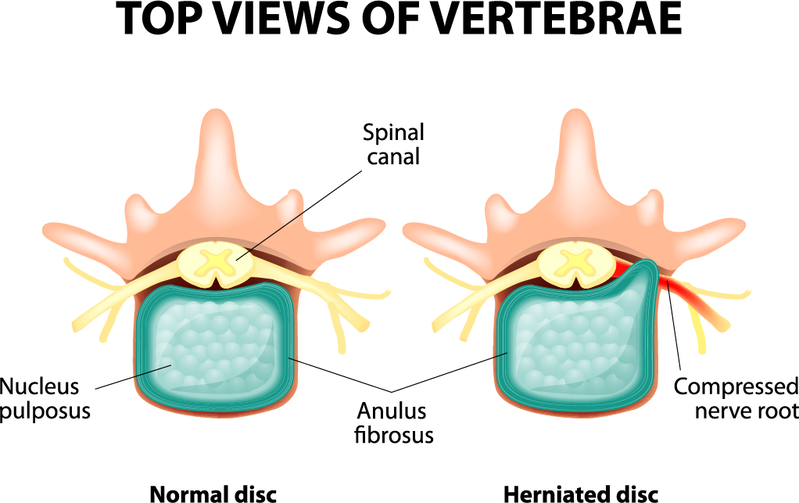
A herniated disc is a very common cause of back pain that can occur anywhere along the spine, but most likely occurs in the lower back or neck.
Discs are soft, rubbery pads located between the vertebrae in the spine that act as shock absorbers and allow the spine to flex and bend. However, this means that the discs take on a great deal of stress.
Spinal discs have a ring of cartilage along the outside that contains a gel-like substance. The outer cartilage of the disc can weaken over time or with a sudden injury, causing the inner disc material to push through that outer wall.
This condition is known as a herniated disc but is also commonly referred to as a slipped or ruptured disc. A herniated disc puts pressure on the spinal nerves and can be very painful.

Causes of a Herniated Disc
There are several reasons why a disc might herniate. One common factor that contributes to a herniated disc is the weakening of the discs over time. When you are young, your discs have high water content. However, the water content in your discs reduces as you age, causing the discs to shrink and become less flexible over time. This increases the likelihood of herniating a disc.
A herniated disc can also occur from an injury. A sudden increase in disc pressure caused by a car accident, heavy lifting, slip, and fall, or another injury can cause the outer disc to rupture or tear, and the inner gel can leak out.
There are other factors that can contribute to the weakening of a disc, including smoking, being overweight, improper lifting techniques, and, in some cases, genetic history.
Symptoms of a Herniated Disc
Depending on the location of the herniated disc, it may produce different symptoms. In addition to pain, a herniated disc in the back may cause a condition called sciatica, which produces a shooting pain that extends from the buttocks all the way down the leg due to pressure on one of the spinal nerves. A herniated disc in the back may also cause weakness, tingling, and/or numbness in one or both of the legs or feet. In severe cases, a herniated disc can also cause loss of bladder or bowel control. In these cases, you should seek immediate medical attention.
A herniated disc in the neck produces similar symptoms, but will typically affect the arms rather than the legs and feet. Weakness, tingling, and/or numbness in one arm are common symptoms of a herniated disc in the neck. A herniated disc in the neck can also cause burning pain and/or weakness in the shoulders, neck, arm, forearm, or hand.
Back or neck pain alone is not enough information to diagnose a herniated disc. An examination is necessary to diagnose a herniated disc correctly. Dr. Ball may use imaging tests like MRIs to diagnose and locate the herniated disc. In some cases, more than one disc may be involved.
Treatments Options for a Herniated Disc
In some cases, symptoms of a herniated disc can be managed without the need for surgery. However, if nonsurgical treatments are not effective, surgery may be considered. At CalSpine MD, Dr. Ball offers a full range of treatments for a herniated disc, whether you need surgery or pain management treatments.
During your consultation, Dr. Ball will determine the course of treatment that best meets your needs.
Nonsurgical Treatment for a Herniated Disc
Nonsurgical treatment for a herniated disc will typically involve medications to help with inflammation. In some cases, over-the-counter pain medications may be sufficient for relieving pain. Steroids and anti-inflammatory medications can also help with herniated disc symptoms.
Physical therapy is a recommended initial treatment for suspected disc herniations. Cold compresses and gentle heat may also be used to help reduce herniated disc symptoms. Exercises that strengthen the back and abdominal muscles may be recommended, and patients should learn proper lifting, sitting, and standing techniques to avoid pain episodes in the future. Some patients with a herniated disc find it helpful to take frequent short walks and avoid sitting for extended periods of time.
At CalSpine MD, Dr. Ball also offers interventional pain procedures such as epidural steroid injections for patients with a herniated disc whose symptoms are not effectively managed with the noninvasive treatments mentioned above. These injections can reduce inflammation, which helps lessen the irritation of the spinal nerves. Dr. Ball also works with an excellent consultant network of pain management specialists who may perform interventional pain procedures.
Surgical Treatment for a Herniated Disc
If an extended period of nonsurgical treatment does not alleviate herniated disc symptoms, surgery may be recommended. There are two surgical options for herniated disc surgery: microdiscectomy and discectomy and fusion.
Dr. Ball typically recommends microdiscectomy for a herniated disc in the lower back. This is a minimally invasive technique that is often done in an outpatient setting. During a microdiscectomy, Dr. Ball removes the herniated portion of the disc, as well as any other disc material that is irritating the spinal nerve.
For a herniated disc in the neck, Dr. Ball may recommend a simple posterior foraminotomy procedure, an artificial disc replacement, or cervical discectomy and fusion. During this procedure, the herniated disc is completely removed, and a bone graft is put in its place to allow the vertebrae above and below the disc space to fuse together. Fixation devices like metal plates may be used to hold the bones in place.
For many patients, the nerve pain from a herniated disc is improved immediately following surgery. Full recovery can take weeks to months; most patients feel well a few weeks after surgery. Physical therapy may be recommended during the recovery process.
Herniated Disc Treatment in San Ramon, California and Fremont, California
At CalSpine MD, Dr. Ball frequently treats patients suffering from a herniated disc and offers a full range of treatment options to help alleviate patients’ symptoms. If you would like to schedule an appointment with Dr. Ball, please call our office at (925) 667-3745. You may also Request An Appointment online.




